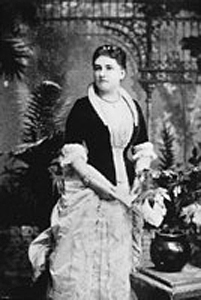Frances Swiney facts for kids
Rosa Frances Emily Swiney (born Biggs; 21 April 1847 – 3 May 1922) was an important British writer and activist. She was a feminist, meaning she worked for equal rights for women. She was also a theosophist, which means she followed a spiritual philosophy.
Contents
Frances Swiney's Life Story
Rosa Frances Emily Biggs was born in Poona, India. However, she spent most of her childhood growing up in Ireland.
In 1871, she married Major John Swiney. For a while, she focused on being a wife and mother. In 1877, she moved to Cheltenham, a town in England. She later called Cheltenham "the town of no ideals." Her husband joined her there ten years later.
Becoming an Activist
Starting in 1890, Frances Swiney became a strong voice for women's rights in Cheltenham. She gave talks and wrote many articles.
In 1896, she helped start the Cheltenham Women's Suffrage Society. This group worked to get women the right to vote. She was also a leader in other groups. These included the Cheltenham Food Reform and Health Association. She also gave talks at places like the Higher Thought Centre in London.
Swiney was a member of several important societies. These included the Theosophical Society, which studied spiritual ideas. She also joined the Sociological Society and the National Union of Women Workers. She was part of the Woman's Freedom League and the National Woman's Social and Political Union. These groups all worked for women's rights.
Friends and Connections
Frances Swiney knew many famous people of her time. These included Charlotte Despard, Harriet McIlquham, and Annie Besant. These connections helped her spread her ideas.
In 1909, Swiney started an organization called the League of Isis. From 1910, this group helped publish her books. The League of Isis wanted to improve humanity. They believed this could happen by following natural laws of life. They also believed in building a "Higher Self."
This organization and her writings show her deep interest in Theosophy. Theosophy teaches about spiritual growth. It also believes in a "Divine Mother," like the goddess Isis. Swiney believed Theosophy could connect science and religion.
Her Ideas: Theosophy, Motherhood, and Feminism
Frances Swiney's ideas were shaped by how people thought about motherhood and human development at the time. She was a Theosophist and a feminist.
Like other feminists, she took the idea of motherhood and made it a strength. She argued that women deserved rights because they helped create the nation's wealth. She also said they were the "mothers of the race." This meant women were vital for the future of humanity.
Swiney's focus on motherhood and human progress also shaped her Theosophy. She focused on the "Divine Feminine" or "Divine Mother." She saw this as the goddess Isis. Swiney believed the Divine Mother played a key role in the universe. Her ideas about this were different from what most Theosophists believed. This shows how she used her spiritual beliefs to support her feminist goals.
She wrote that the Mother is the "Supreme Unity." This means the Mother connects everything. Swiney believed humanity was starting to understand the truth of the Divine Feminine. She felt that when humanity was young, it pushed the Mother away. This led to problems. She thought that truly developed people always wanted to reunite with the Feminine Principle.
For Swiney, the soul was the "feminine creative principle" in people. She believed that women were a real-life example of the Divine Feminine.
Swiney's experiences in British India also influenced her ideas. Theosophy and spiritual beliefs were very common among early British feminists. Many feminists who believed in Theosophy shared her views.
Frances Swiney's Writings
- The Plea of Disfranchised Women (1896)
- The Awakening of Women, or, Woman’s Part in Evolution (1899)
- The Cosmic Procession or The Feminine Principle in Evolution (1906)
- The Bar of Isis (1907)
- The Mystery of the Circle and the Cross (1908)
- The Esoteric Teaching of the Gnostics (1909)
- Racial Poisons (1910–12)
- Racial Problems (1910–14)
- Woman and Natural Law (1912)
- Responsibilities of Fatherhood (1912)
- ‘Our Indian Sisters’, Racial Pamphlets No. 12 (1914)
- The Ancient Road, or, The Development of the Soul (1918)
Death
Frances Swiney passed away on 2 May 1922. She was 75 years old.
See also
Images for kids
 | Dorothy Vaughan |
 | Charles Henry Turner |
 | Hildrus Poindexter |
 | Henry Cecil McBay |



